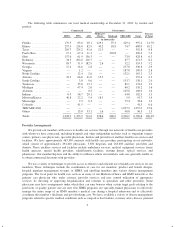Humana 2003 Annual Report Download - page 22
Download and view the complete annual report
Please find page 22 of the 2003 Humana annual report below. You can navigate through the pages in the report by either clicking on the pages listed below, or by using the keyword search tool below to find specific information within the annual report.
and state bodies continue to consider and enact significant and sometimes onerous managed care laws
and regulations.
Enforcement of health care fraud and abuse laws has become a top priority for the nation’s law enforcement
entities. The funding of such law enforcement efforts has increased dramatically in the past few years and is
expected to continue. The focus of these efforts has been directed at participants in federal government health
care programs such as Medicare+Choice, Medicaid, and the Federal Employee Health Benefits Program, or
FEHBP. We participate extensively in these programs and have continued our stringent regulatory compliance
efforts for these programs. The programs are subject to very technical rules. When combined with law
enforcement intolerance for any level of noncompliance, these rules mean that compliance efforts in this area
continue to be challenging.
We are subject to various governmental audits, investigations, and enforcement actions. These include
possible government actions relating to the Employee Retirement Income Security Act, as amended, or ERISA,
FEHBP, federal and state fraud and abuse laws, and other laws relating to Medicare+Choice, including adjusted
community rating development, special payment status, and various other areas. Adjusted community rating
development is the government-defined rating formula used to explain the Medicare+Choice benefits we offer
individuals eligible for Medicare benefits based on a particular community and certain other factors. Special
payment status refers to, among others, Medicare+Choice members who are institutionalized, Medicaid-eligible,
or members who have contracted end-stage renal disease. The Medicare+Choice plan receives a higher payment
for members who qualify for one or more of these statuses. We are currently involved in various government
investigations, audits and reviews, some of which are under ERISA, and others under the authority of various
states’ departments of insurance. On May 31, 2000, we entered into a five-year Corporate Integrity Agreement
with the Office of the Inspector General for the Department of Health and Human Services as part of a settlement
of a Medicare overpayment issue arising from an audit by the Office of the Inspector General. Although any of
the pending government actions could result in assessment of damages, civil or criminal fines or penalties, and
other sanctions against us, including exclusion from participation in government programs, we do not believe the
results of any of these actions, individually or in the aggregate, will have a material adverse effect on our
financial position, results of operations, or cash flows.
Of our seven licensed and active HMO subsidiaries as of February 1, 2004, five are qualified under the
Federal Health Maintenance Organization Act of 1973, as amended. To obtain federal qualification, an HMO
must meet certain requirements, including conformance with benefit, rating, and financial reporting standards.
As of February 1, 2004, Humana Medical Plan, Inc., Humana Health Plan of Texas, Inc., and Humana
Health Plan, Inc. each hold CMS contracts under the Medicare+Choice program to sell Medicare HMO products
in a total of seven states. In addition, Humana Insurance Company holds CMS contracts under a
Medicare+Choice program to sell a private fee-for-service product in eleven states and a pilot PPO product in
three counties in Florida.
CMS conducts audits of HMOs qualified under its Medicare+Choice program at least biannually and may
perform other reviews more frequently to determine compliance with federal regulations and contractual
obligations. These audits include review of the HMOs’ administration and management, including management
information and data collection systems, fiscal stability, utilization management and physician incentive
arrangements, health services delivery, quality assurance, marketing, enrollment and disenrollment activity,
claims processing, and complaint systems.
CMS regulations require submission of quarterly and annual financial statements. In addition, CMS requires
certain disclosures to CMS and to Medicare+Choice beneficiaries concerning operations of a health plan
contracted under the Medicare+Choice program. CMS’s rules require disclosure to members upon request of
information concerning financial arrangements and incentive plans between an HMO and physicians in the
HMOs’ networks. These rules also require certain levels of stop-loss coverage to protect contracted physicians
14
























